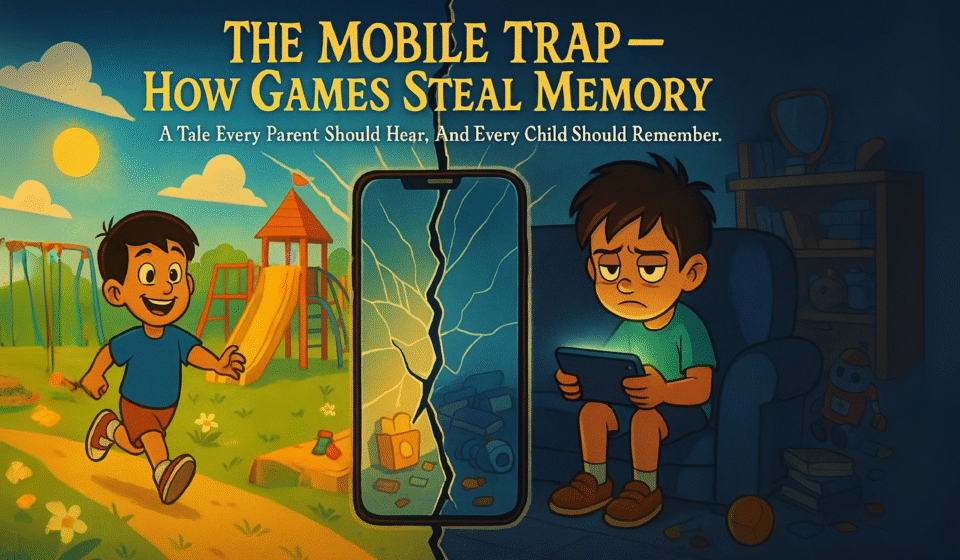
The Mobile Trap – How Games Steal Memory

Dipti came out of the hospital holding her beloved son Swapnil’s hand. Her face was clouded with worry. Back home, when her husband asked what had happened, Dipti broke down into tears.

For the past few months, Dipti and her husband had been worried about their son Swapnil. A very intelligent and talented child, Swapnil had been showing troubling signs lately. His main complaints? He had become irritable, short-tempered, lazy, easily bored, moody, constantly saying “I’ll do it later… not now”, and often forgot things. Whenever he was busy with his mobile phone, he didn’t even hear his parents or teachers.

Dipti took Swapnil to their family doctor, Dr. Manan. After hearing Dipti’s complaints and observing Swapnil’s behavior, the doctor explained that there was no major illness. However, Swapnil’s prolonged attachment to mobile gaming was the root cause of his problems.
According to the journal Frontiers in Public Health (2019), the main reasons for irritability, anxiety, and restlessness in children are their excessive obsession with mobile phones. Playing mobile games excessively reduces memory power. Not only that, children busy with social media lose creativity and fall prey to many negative effects.

Research from Scholar Hub (2024) states that violent game content increases aggression in students’ behavior. Sensitivity and empathy decline. When children prioritize mobile gaming over studies, their time management weakens, affecting both education and extracurricular activities. As outdoor games disappear and fast food consumption increases, obesity problems emerge.
The negative effects of mobile use on students’ memory are very serious.
Repeated mobile gaming obstructs positivity, reduces attention spans, and shortens concentration periods. Excessive screen time and information overload negatively affect short-term memory. Constant switching between games and apps decreases creativity in processing new information.

According to News Medical (2024), prolonged mobile gaming leads to memory loss.
The habit of watching mobiles late at night disrupts sleep patterns, which also damages memory. A study in Journal Plus One (2023) found that students addicted to mobile gaming experience deteriorating mental health, relationships, and academic outcomes.
A balanced approach between studies and other areas of life is necessary.

Students have forgotten independent writing and now rely heavily on copy-pasting.
A survey of parents revealed that their main complaints about their children included irritability, frequent anger, laziness, and forgetfulness.
But then comes the big question:
How can children be freed from mobile addiction?
For every student today, the mobile has become an addiction—an obstacle to success.
The only solution is for parents themselves to reduce mobile usage and revive reading habits at home.

📚 A Thought from Gijubhai Badheka:
In schools, a person merely acquires knowledge, but in libraries, one learns on their own.
A good library fulfills the role of many teachers. Unlike a teacher, a library doesn’t scold, enforce discipline, create harmful competition, or instill fear of exams. It teaches lovingly, humbly, and joyfully.
Disclaimer:
This article reflects the author’s personal insights and reflections. It is shared with the intention of encouraging thoughtful parenting and generational harmony. The project and foundation are acknowledged as part of the original source for transparency and integrity.




